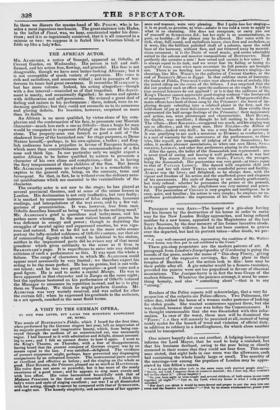A VISIT TO THE GERMAN OPERA, BY ONE WHO LOVES,
BUT LACKS THE SCIENTIFIC KNOWLEDGE OF, MUSIC.
THE music of BEETHOVEN'S Fidelio, which I heard for the first time, when performed by the German singers last year, left an impression of its majestic grandeur and imaginative beauty, which, from being con- veyed through the medium of an uninstructed ear, was necessarily -vague. I had listened to it with admiration and delight, almost amount- ing to awe ; and I felt an earnest desire to hear it again. I went to the King's Theatre, on Thursday, with a fear of disappointment, having heard that the present company of German singers was by no means equal to the last. / was satisfied;—delighted. The vividness of present enjoyment might, perhaps, have prevented any disparaging comparisons by an unlearned listener. The instrumental parts seemed as excellent and effective as before; and the singing on the whole as good. Herr BINDER, the Prisoner, pleased me as much as HAITZINGER. His yoice does not seem so powerful, but it has more of the manly sweetness of a good tenor; and he appears to sing more evenly and with less effort. His voice harmonized beautifully with that of Madame PIRSCHER in the duets and concerted pieces. I think this lady's voice and style of singing excellent ; nor was I at all dissatisfied with her acting, though it cannot be compared with that of SeEntosnErt, and ought not. The homely simplicity, and earnestness of her appear. ance and'manner, were very pleasing. But I quite love her singing. it is so good, so genuine, so true—admire is too cold a term to apply to what is so charming. She does not enrapture, or carry you out of yourself as SCHROEDER did; but her style is so unostentatious, so pure, so healthy—if the phrase may be allowed. Her voice with its rich, clear, full, round, and melodious tones, rises firm and unshaken, as
it were, like the brilliant polished shaft of a column, upon the solid base of the harmony, without flaw, and not frittered away by meretri-
cious ornament : it is the Doric of vocal music, and seems admirably suited to the solemn and massive compositions of BEETHOVEN. How perfectly she sustains a note ! how sound and certain is her voice ! It is always equal to its task, and we never fear its failing or losing its quality of tone, even when upon occassion its full powers are brought out. There is no bawling nor screaming in PIRSCHER'S singing—no shouting, he Mrs. WOOD'S to the galleries of Covent Garden, at the end of ROSSINI'S Moses in Egypt. In that sublime storm of harmony, the finale of Fidelio, PIRSCHER'S voice rose above the sea of melody, like the petrel riding on the crests of the billows. I was surprised that she did not produce such an effect upon the audience as she ought. Is it that true musical listeners do not applaud ? or is it that the audience of the King's Theatre cannot appreciate good singing without "the foreign aid of ornament ?" The choruses, I thought, went well. What powerful dra- matic effects have both of those sung by the Prisoners ! the burst of im- ploring despair subsiding into a subdued plaint in the first, and the wild shout of joy at their deliverance in the second. How vividly they represented the half-savage feelings of the Prisoners.! their appearance and action, too, were picturesque and characteristic. Herr BLUME, the Gaoler, was excellent; I thought he left nothing to be desired. The villain—Herr KocitEar—swaggered too much, and his singing was not so effective ; and the great man, Herr Ern-Ens—the .Killion of Freischiitz—looked very droll ; he was a very Sancho of a governor. It was gratifying to see such a musician as HUMMEL as conductor ; it is a sort of warranty for the correctness of the performance, to those who, like myself; are incapable of judging of it for themselves ; be- sides, it awakes pleasant associations, as when one sees Mom, SrAc- NOLETTI, LINDLEY, and other fine performers playing in the orchestra. After the opera, the ballet of the Sonanambule was represented : one is never tired of seeing and hearing it well performed, as it was last night. The sisters ELSLER were the rivals; FANNY, the younger, being the Sonmanzbule. Her pantomime was very good—at times equal to that of PAULINE LEROUX. She danced with exquisite skill and grace; and her tall sister TERESA with wonderful power and facility. ALBERT was the lciver; and delighted, as he always does, with the vigour and freedom of his action and the unaffected grace and elegance of his movements. His style of dancing is not merely gentlemanly, but truly refined : whether he personates the prince or the peasant, he is equally appropriate : his playfulness was very natural and grace- ful. The pantomime of Cout.ox is very graphic and intelligent : he is easy, quiet, and familiar; his action is very simple; he employs no su- perfluous gesticulation : the expression of his face almost tells the story.


















 Previous page
Previous page